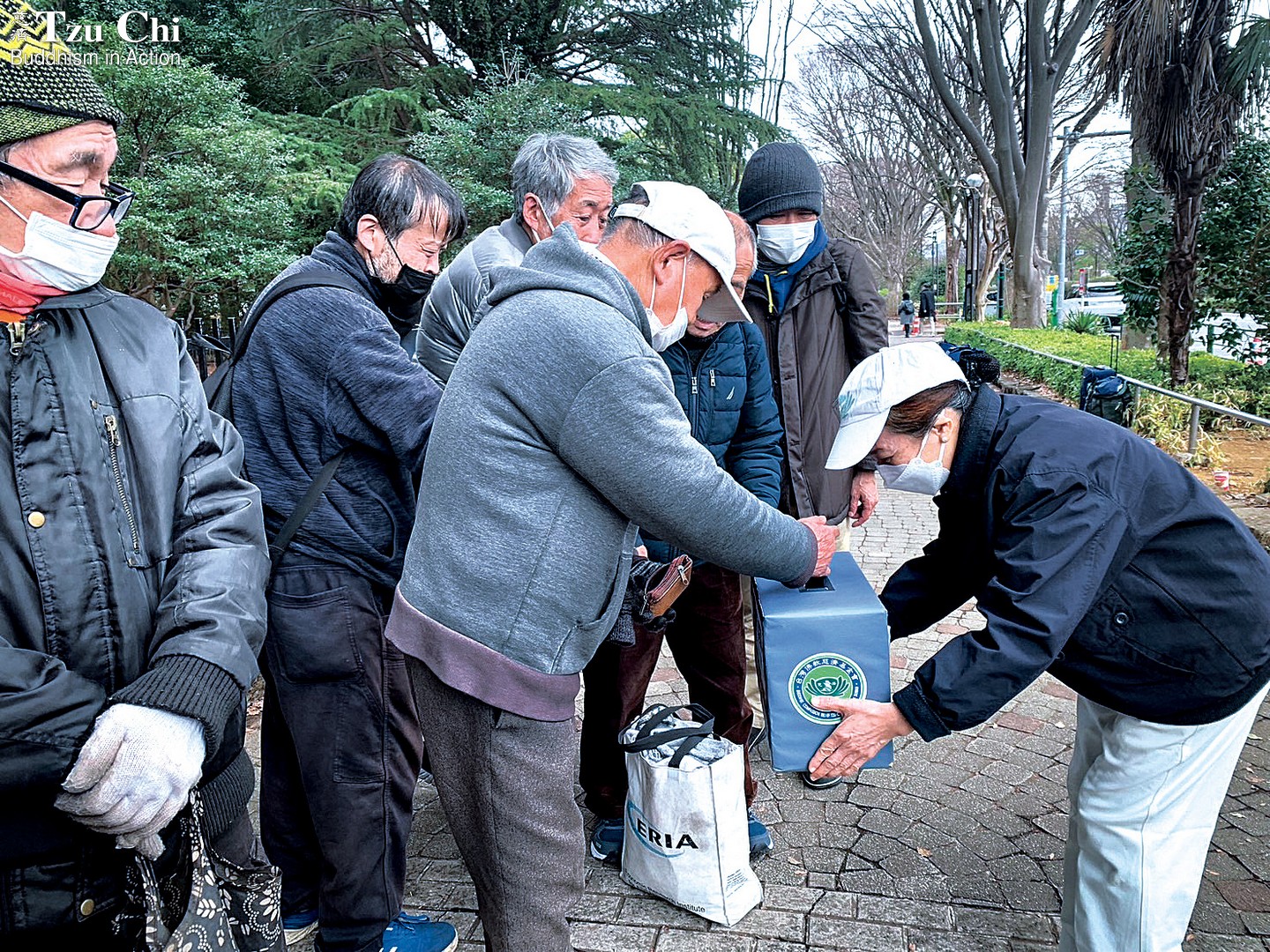Text and photo by Yi Yi
Translated by Wu Hsiao-ting

Homeless people generously donate to aid earthquake victims in the Noto Peninsula during a Tzu Chi hot meal distribution held in Yoyogi Park, Tokyo.
As I watched the homeless people dropping their donations into the collection box, I felt that each one of them was a real-life bodhisattva.
Earlier this year, while on a family trip in Japan, I put on my Tzu Chi uniform and met up with several familiar fellow volunteers in Tokyo. It happened to be one of the days when volunteers from the Tzu Chi Japan chapter distributed hot meals to the homeless at Yoyogi Park. They’ve been doing this twice a month for 14 years.
Though the distribution hadn’t even started, nearly 60 homeless people had already formed a long queue at the park, patiently awaiting their meals. They looked like any other passersby, with somewhat tidy hair and clothes, but seemed a bit weary and lacking in confidence. I recalled seeing homeless individuals wrapped in blankets, sleeping by the roadside near Shibuya Station last night; I wondered if any of them were in this queue.
As we entered the park, I noticed several large trees that had shed all their leaves, leaving bare branches stretching out, adding a hint of coldness to the winter scenery. Volunteers swiftly set up the site, arranging tables, electric cookers, bowls, and utensils. They also hung Tzu Chi flags on trees and tables. There aren’t many Tzu Chi volunteers in Tokyo, and some had gone to the quake-stricken zone on the Noto Peninsula in western Japan for relief efforts. But despite the limited manpower, those who remained dutifully ensured the homeless received a warm meal.
Other volunteers and I stood in an orderly manner across from the homeless people before commencing the distribution. Huang Yun-xuan (黃韻璇) took the microphone and greeted everyone in fluent Japanese: “We thank all of you for joining us at the Tzu Chi hot meal distribution site and waiting patiently. Today’s menu is rice with assorted ingredients, and we’ve also prepared ginger soup to keep you warm. We hope everyone takes good care of themselves in this winter season and avoids catching a cold!”
She continued, saying that a powerful earthquake had struck right on the first day of this year, and Tzu Chi volunteers in Japan had been providing hot meals in the disaster area since January 13, at an evacuation center and hospital in the town of Anamizu, Ishikawa Prefecture. “Seeing the recipients of these meals smiling and expressing their gratitude, all the volunteers serving in the disaster area feel blessed for the opportunity to assist them.” She encouraged everyone to help the survivors, emphasizing, “Regardless of the size of your donation, your contributions accumulate and become our strong support; I believe your blessings will reach the quake victims.”
After Huang’s brief speech, all of us Tzu Chi volunteers took a deep bow. Then some music started playing, and together, the homeless attendees sang the Japanese version of the Tzu Chi song “Prayer.” I closed my eyes, immersing myself in the moment with my ears: the sounds of wind, traffic, and birdcalls seemed to fade away, leaving only the heartfelt singing echoing in the expansive Yoyogi Park. I felt the cool air I breathed in, now with a hint of warmth and moisture. The emotional moment made my nose tingle and burn.
When the singing—which served as a form of prayer—concluded, several homeless individuals dropped coins into a donation box held out by a volunteer. One of them carefully retrieved a plastic bag from his backpack, extracted an envelope from it, then withdrew coins from the envelope to deposit into the box. It was evident from how he safeguarded the coins that he treasured them, but now he generously donated them to help the needy. Through their acts of giving, these homeless people transcended their anonymity on the fringe of society, emerging as individuals with loving hearts shining like precious jewels!
The steaming white rice and fragrant assorted vegetable stew prepared by our volunteers were mouth-watering. I was tasked with carrying trays and serving the hot food to the homeless. I only knew a few simple Japanese phrases, but I had remembered one of the key points of our distributions: a 90-degree bow, expressing gratitude to the recipients for allowing us to serve them.
Each time I bowed, I saw the shoes of the homeless attendees—each pair worn and stained with mud. Yet, despite the situation they were in, each of them was like a future buddha to me, teaching me via this distribution the meaning of the Three Spheres of Emptiness. In giving, you don’t see yourself as the giver, others as the receivers, or what is given as the gift. We avoid pride in being the helper and instead view helping others as a natural obligation. With the utmost respect, I bowed to them.
Suffering is ever-present in this vast world. Fortunately, there are Tzu Chi volunteers around the world. Like tiny dots of light, they combine their strengths to weave a vast net of compassion, gently catching those in need. When the love within the heart of an aid recipient is ignited, they too can become givers, spreading the spirit of compassion and kindness to others.



